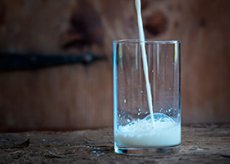New publications
To keep beauty and health will help... milk
Last reviewed: 01.07.2025

All iLive content is medically reviewed or fact checked to ensure as much factual accuracy as possible.
We have strict sourcing guidelines and only link to reputable media sites, academic research institutions and, whenever possible, medically peer reviewed studies. Note that the numbers in parentheses ([1], [2], etc.) are clickable links to these studies.
If you feel that any of our content is inaccurate, out-of-date, or otherwise questionable, please select it and press Ctrl + Enter.

With the onset of cold weather, a person may feel weak, in a bad mood, and have an unhealthy complexion. This may be due to a lack of important vitamins and microelements, weakened immune system, colds, etc. Of course, you can replenish your body's vitamin supply with special vitamin preparations, or you can drink regular milk. Just 2 glasses a day will help your body stay strong and healthy.
However, milk is not the same, it differs in origin, heat treatment, composition. We are used to drinking milk of animal origin - cow, goat (in some countries they drink mare's milk).
Cow's milk is the most useful. One glass of milk contains 30% of the required daily dose of calcium, 11% potassium, 24% vitamin. And goat's milk is very close to cow's milk in its composition, but has a specific smell and a sweetish taste.
Among plant-based milks, soy milk is more useful (it can be compared with cow's milk). But there is one significant drawback - milk can be produced from modified soy.
There are now special types of dairy products: organic, which do not contain growth hormones, pesticides, antibiotics, etc. But such milk costs several times more than ordinary milk. There is also skim milk, which is practically no different from ordinary milk in taste, smell, and color.
Lactose-free milk (without milk sugar) is another modern type of milk that has been developed specifically for people with lactose intolerance. About 80% of the daily calcium intake can be obtained by consuming milk and dairy products.
Proper heat treatment does not destroy the nutritional properties of milk. Milk tends to spoil due to bacteria, which in large quantities cause oxidation of the product. If such bacteria are destroyed, the shelf life of milk will increase.
Fresh milk (fresh, not subjected to heat treatment) contains the maximum amount of microelements, proteins, vitamins. But it is useful to drink such milk no later than three hours after milking, otherwise harmful microorganisms begin to multiply in it. If several hours have passed since milking, the milk must be boiled, which kills harmful bacteria and some of the nutrients.
At factories, during pasteurization or ultra-pasteurization, harmful bacteria are destroyed by special temperature treatment, while preserving the maximum amount of useful microelements and vitamins. At the same time, the taste and external properties of milk are preserved.
Milk that has undergone high-temperature processing, unlike pasteurized milk, will be stored for 3-4 months, but will lose some of its vitamins. Such milk is good for making homemade yogurts, from which you can also make an excellent nourishing face mask.
The most popular method of milk processing is sterilization. Milk can be stored for up to 6 months, but 50% of useful vitamins and microelements are lost.
An adult needs about 400 ml of milk per day to stay healthy. Milk contains three important amino acids that our body does not produce on its own, but can only get from food:
- Methionine is involved in fat metabolism; a deficiency can lead to obesity.
- lysine maintains hemoglobin levels, regulates the hematopoietic system
- Tryptophan is needed for the synthesis of serotonin and other important substances; if there is a deficiency, metabolism is disrupted.
Milk also contains potassium, sodium, iron, magnesium, calcium, hydrochloric, citric, phosphoric acids, copper, manganese, zinc, iodine, boron, etc. In total, milk contains about 30 vitamins, the most important of which are A, B1, B2, the lack of which leads to dysfunction of some systems and organs.
 [ 1 ]
[ 1 ]
